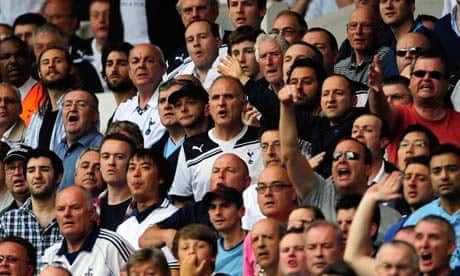Who is John Crace? To you, the Guardian reader, he's that talented chap who has, in the past 10 years, turned his Digested Read column into a national institution. But that, judging by his new book, is not how he views himself. In the mirror he sees two things, an almost comically committed fan of Tottenham Hotspur Football Club and a person who, for the past 20 years, has fought an often losing battle with depression. Vertigo – ostensibly a knockabout journey through Tottenham's 2010/2011 season – is actually about the relationship between the two things that, if you cut Crace in half, would be written through him – Spurs and desolation.
What a tangled web it is. On the one hand there is his devotion to Tottenham, as deep and daft as anything we've read in the regular stream of "I'm-more-fervent-about-my-crap-football-team-than-you-are-about-yours" fan memoirs that peaked, but did not stop, with Nick Hornby's Fever Pitch. Crace follows the team to the dimmest recesses of this country and Europe; he collects mountains of unmemorable memorabilia; he neglects his family in order to catch an obscure game on TV. He also hugely over-identifies himself with the club: when, in a chance meeting with novelist Jim Crace, he discovers they are distantly related, he enjoys his new found Jewishness primarily because it further ties him to Spurs, the most Hebrew of football institutions. Most telling of all, given what we come to learn about his fluctuating mental health, he measures the remainder of his life by the numbers of future football seasons he's likely to see.
Then there's the depression. It is described, unsurprisingly, with deftness and an intensity of personal detail that, while harrowing, never tips into self-pity. It is genuinely shocking to discover that the man behind so much impish, energetic writing is sometimes so ossified by anxiety and apathy that he cannot drag himself from his bed. Equally, it's almost comforting to learn that, during his one stay in a psychiatric hospital, the "competitive bastard" in him cannot help but make him dominate, and win, the theoretically therapeutic general knowledge quizzes.
The crux of all this is that despite the nervousness, panic, uncertainty and stress that it engenders, football is what allows him to escape, momentarily and weirdly, from the clutches of his condition. "Football", he says, "is our brief time out from all that, a time when everything gets sublimated to the common cause of getting to and from a match. Winning is merely a bonus. We know we'll get back to whatever else it is we're worried about soon enough. So think of it like going to a health spa. Only without the pampering."
Vertigo exposes the self-delusion, moral gymnastics and nervous tics that are the lot of any football fan following a team in the modern game. It also vividly, and stoically, describes the plight of those blighted by the black dog. Only one thing prevents the book from being truly lovable, and that is the fact that Crace, in the long spells when he is clear of his clinical depression, is still a bit of a misery.
Not to put too fine a point on it, he makes Victor Meldrew, Morrissey and Marvin the Paranoid Android seem like the Marx Brothers. No page is without its frowning, nay-saying and dim-viewing. "I'm a negative person," he warns us on page 10, before going on to prove it at every subsequent opportunity.
Everything is a problem. Writing? A hugely disappointing endeavour. A meeting with actor Robert Carlyle? "Bit of a prat." The prospect of carnal delight with an international beauty? "Sleeping with Sienna Miller is probably quite exciting the first time; after that it probably just feels routine." It's supposed to be funny, but on occasions it gets wearying. I'm the same age as Crace, and have endured Tottenham's vicissitudes with equal intensity, yet my glass remains approximately half full.
This is a shame because beneath the conflict and head-clutching, there is some heartening stuff. His determined frittering of a £20,000 inheritance on old programmes and ticket stubs is comic genius, especially as his collection, post-recession, is now worth more than most people's pensions. The flowering of his relationships with his sister Veronica and his son Robbie – both using the wonder cure-all of the national game – are delightful to share with him. Even in the darkest night, as the songs goes, a candle glows …
Mind you, this book opens with Tottenham defeating Manchester City 15 months ago to qualify for the Champions League. Manchester City have recently thrashed Tottenham, and the latter are showing mixed form once again. Cue the next chapter of Crace's excellent, amusing, occasionally infuriating book.
Danny Kelly's Classic Football Debates (with Danny Baker) is published by Ebury.

Comments (…)
Sign in or create your Guardian account to join the discussion